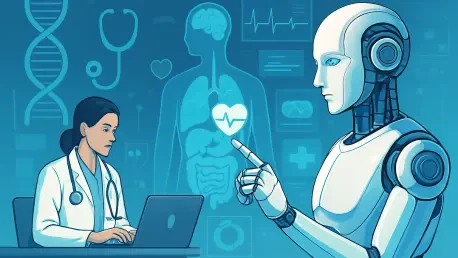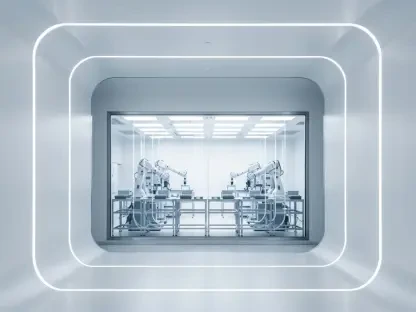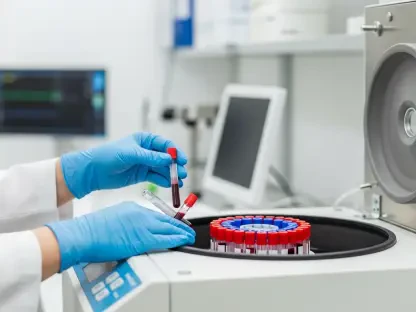Artificial Intelligence (AI) is significantly transforming the healthcare industry, altering how care is delivered, experienced, and managed. As medical institutions worldwide strive for more effective and efficient service delivery, AI emerges as a pivotal force driving innovation and optimization. The cutting-edge technology is revolutionizing various facets of healthcare, from diagnostics to treatment personalization, thereby changing the industry’s landscape. By bridging vast medical datasets with high computational power, AI enables unprecedented levels of precision and efficiency. This transformation is particularly evident in disease diagnosis, where AI’s capability for pattern recognition and data analysis often surpasses a human’s natural capacity, promising remarkable improvements in patient outcomes and operational workflows.
Enhancing Diagnostic Accuracy
AI technologies are reshaping diagnostic procedures across multiple medical disciplines by applying sophisticated algorithms to interpret complex data sets. Radiology exemplifies AI’s promise, with AI tools routinely analyzing X-rays, MRIs, and CT scans to detect abnormalities that might escape human eyes. Such tools have become indispensable in the early detection of cancers and other life-threatening conditions, where timely diagnosis is crucial for successful treatment. Further, AI’s application extends to analyzing pathology slides and genetic data, leading to accurate identification and understanding of various diseases. AI has become an essential partner to human expertise in diagnostics, enhancing specialists’ ability to deliver reliable and swift diagnoses.
Beyond straightforward diagnostics, AI significantly contributes to specialized fields like oncology by supporting personalized treatment plans. AI algorithms can accommodate a patient’s genetic makeup and pre-existing conditions to propose highly individualized therapy strategies. This personalized approach improves the efficacy of treatment regimens and aligns with the broader shift toward value-based care, emphasizing not only patient well-being but also cost-effectiveness. The integration of AI into diagnostic and treatment processes highlights its role as a meta-tool in modern medicine, ultimately deepening the bond between technology and healthcare for better patient care.
Revolutionizing Personalized Medicine
AI’s contributions to personalized medicine represent a significant leap forward in healthcare. By delving into the specificities of individual patients, AI creates opportunities for care that is precisely tailored to the unique needs of each patient. This is achieved through AI’s ability to efficiently process and analyze complex datasets, encompassing genetic profiles, medical histories, lifestyle factors, and more. In the realm of genomic medicine, AI has expedited the identification of genetic markers that influence disease susceptibility and treatment responses, offering precise options for preventive care and targeted therapies.
Personalized medicine facilitated by AI leads to improved outcomes by customizing treatment plans based on comprehensive data analysis. As AI continues to evolve, the ways it informs clinical decisions will become increasingly refined, resulting in more effective management strategies. These improvements suggest a promising horizon where treatments are more efficient and outcomes are consistently improved, enhancing healthcare’s ability to meet modern demands. AI translates vast amounts of data into actionable insights, enabling healthcare providers to offer treatments tailored specifically to a patient’s unique biological and environmental context.
Streamlining Healthcare Administration
In addition to medical procedures, AI significantly optimizes healthcare administration by automating routine tasks and streamlining workflows. Administrative processes like appointment scheduling, claims processing, and resource allocation are more efficient with AI-powered robotic process automation. This automation allows healthcare professionals to redirect their focus towards patient-centered services, ensuring more direct and personal care delivery. AI systems also lend themselves to real-time clinical decision support, providing alerts and suggestions that enhance decision-making.
The adoption of AI in administrative settings leads to improved resource management, reduced operational costs, and enhanced service delivery, contributing to heightened patient satisfaction. Predictive analytics, another powerful AI application, aids in foreseeing factors such as patient admittance rates, staff shortages, and resource shortages, helping healthcare facilities better prepare and react. Overall, AI’s seamless integration into the fabric of healthcare administration paves the way for more efficient systems that align with both immediate patient needs and broader organizational goals.
Overcoming Challenges in AI Adoption
Despite AI’s transformative potential, several challenges accompany its integration into healthcare systems. Ensuring compliance with health regulations, such as HIPAA, while driving innovation presents a complex challenge. The risk of algorithmic bias, often stemming from non-representative datasets, raises concerns of disparity in healthcare delivery, necessitating rigorous bias audits and inclusion efforts. Interoperability issues in Electronic Health Records present further difficulties, with fragmented data hindering AI systems’ effectiveness. Efforts to standardize data collection and sharing across healthcare organizations are critical for advancing AI utility.
Furthermore, cultural resistance and infrastructure limitations pose significant hurdles. Staff apprehensions about job displacement and mistrust in automation’s reliability highlight the need for comprehensive education and collaboration. Investing in digital infrastructure, such as enhanced internet connectivity and mobile health solutions, is crucial to fully leverage AI’s capabilities. Overcoming these obstacles requires concerted efforts from healthcare providers, technologists, and regulatory bodies, ensuring AI remains a formidable tool in elevating healthcare standards.
AI as a Strategic Partner in Healthcare
AI technologies are revolutionizing diagnostic methods across various medical fields by employing sophisticated algorithms to interpret intricate data sets. Radiology stands as a prime example, where AI routinely analyzes X-rays, MRIs, and CT scans, pinpointing abnormalities often missed by human eyes. These tools are critical for early cancer detection and identifying other severe conditions, essential for timely, effective treatment. Furthermore, AI extends its application to the analysis of pathology slides and genetic information, allowing for precise disease identification and understanding. AI has become a vital ally to human professionals in diagnostics, enhancing the accuracy and speed of diagnoses.
Beyond typical diagnostics, AI plays a pivotal role in specialized areas like oncology, supporting personalized treatment plans. By considering a patient’s genetics and medical history, AI algorithms suggest tailored therapy strategies, boosting treatment effectiveness while aligning with the shift towards value-based care. This integration underscores AI’s importance in modern medicine, forging a stronger connection between technology and healthcare for improved patient outcomes.









